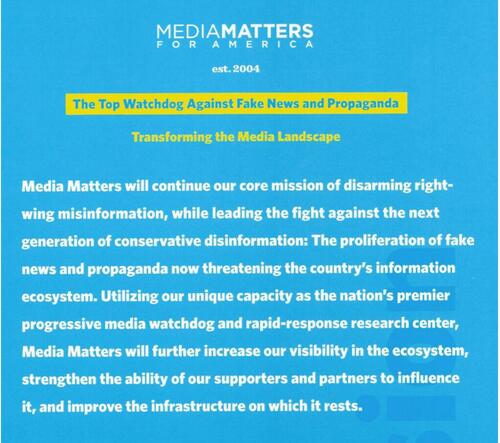
Authored by Paul Thacker via The DisInformation Chronicle (subscribe here)
Editors at the New York Post commissioned me to write a piece last weekend explaining how the Democratic Party has been targeting Elon Musk for buying Twitter and taking away their ability to censor critics and label them “disinformation.” The issue came to a head after Musk vented during an interview when asked about Disney and other companies pulling advertising over alleged antisemitism on his platform.
“If someone is going to try and blackmail me with advertising? Blackmail me with money? Go fuck yourself," Elon Musk said. Musk repeated the advice with a wave of his hand toward Disney’s Bob Iger, a Musk critic and Biden administration donor and functionary.
“Go. Fuck. Yourself. Is that clear? Hey, Bob, if you’re in the audience.”
Within hours of the intervew, dozens of parodies began appearing on X, including this one. But if you read about the exchange in any media outlet, you would think Musk was coming unhinged, attacking advertisers who support his own company.
This is far from reality. Democratic operatives including Disney’s Bob Iger have been harassing Musk since he took over Twitter and released company documents showing the government and Democratic Party aligned organizations were censoring Americans. You can read some of my reporting on these Twitter Files here, here, here, here, and here.
After the New York Post published my essay, I found that Musk had predicted a dirty tricks campaign over a year and a half ago.
The tactics being used against Musk are quite simple to understand if you know the various figures involved, their backgrounds, and finances. First, Democratic Party attack groups like the Center for Countering Digital Hate (CCDH) and Media Matters for America gin up fake studies that accuse Musk of allowing hate, antisemitism, racism (whatever label they feel is effective) to flourish on social media. Second, Biden campaign donors like Disney’s Bob Iger express panic and flee X, complaining that they can’t be associated with hate.
The media won’t report on this, but it’s a basic squeeze play once you know the characters involved.
In recent months, Musk has sued both the Center for Countering Digital Hate and Media Matters for America for making false allegations of hate at X that have driven away advertisers. Both groups claim to be nonpartisan but actually work to attack opponents of Democratic Party policies.
If you read any story in the press about the CCDH, you would think they’re some lefty nonprofit laboring away to keep the world safe from online hate. A couple headlines just to give you a flavor for this.
But as I documented in an investigation for Tablet, political operatives with the conservative wing of the British Labour Party founded the Center for Countering Digital Hate (CCDH) in 2018 to attack people on the Left and Right. The group’s leader, Imran Ahmed, now asserts that he is “at the forefront of reporting on the hate proliferating on X/Twitter since Musk completed his takeover in late October 2022.”
In reality, Ahmed is also a former Labour Party political operative who ran CCDH and another Labour Party front group to attack the left wing of his own party with vague accusation of hate. While in the UK, Ahmed’s groups helped to run Jeremy Corbyn out of Labour Party leadership and tanked the lefty news site Canary, after starting a boycott of their advertisers.
Former Canary editor Kerry-Anne Mendoza described Ahmed’s war against her leftist news site as a scorched earth campaign that destroyed their advertising revenue and forced mass layoffs. “They accuse you of hate,” she told me. “Our regulator said the opposite, but that was irrelevant.”
Targeting advertisers seems very similar to Ahmed’s current tactics against Musk, no?
Since Ahmed moved the group to Washington, DC, in 2021 one of CCDH’s main targets, aside from X and Elon Musk, has been presidential candidate Robert Kennedy Jr., who leads Biden among young voters, and is suing the administration over censorship. This should not surprise anyone as CCDH’s chairman is Simon Clark, a former senior fellow at the Center for American Progress (CAP), a think tank founded by John Podesta, who chaired Hillary Clinton’s 2016 campaign against Donald Trump.
Ahmed does not disclose CCDH’s funding, but I found that 75% of it comes from dark money sources. Some of this money may be coming out of Hollywood—Bob Iger’s home base. One of the board members on CCDH’s tax records is talent agent Aleen Keshishian, who reps actor Mark Ruffalo, an Ahmed ally in his crusade against Musk.
After I tweeted a series of Twitter Files on Imran Ahmed’s work with the old Twitter to censor people, Musk responded, “Anyone know who is supporting this rat?” A month later, Musk sued CCDH for “faulty reports” that were driving away advertisers. “CCDH’s scare campaign to global advertisers … is an attempt to stifle freedom of speech on the X platform.”
Media Matters has a similar political history, but you won’t find many media outlets explaining this to readers. Instead, reporters often ignore Media Matters’ Democratic Party ties or choose to describe them as a “watchdog.”
When CNN wrote a dismissive article on Musk’s lawsuit, they even described one of Media Mattes’ employees as a “senior investigative reporter.” One of the media experts CNN quoted to downplay the lawsuit is Joan Donovan, one of the many academic “misinformation researchers” who have popped up in recent years to argue in favor of social media censorship.
Again, reality is rather different from what you might read.
The New York Times reported in 2004 that Democratic political operative David Brock created the group in 2004 with help from the Center for American Progress. The paper later noted that Media Matters served as part of Hillary Clinton’s 2016 election “outrage machine.”
After Clinton’s loss, Brock freaked and released a 49-page memo marked “private and confidential” that explained how Media Matters was being retooled to move into the digital space and attack “misinformation.”
But when Biden beat Trump, the Media Matters political machine pivoted to harangue Musk and Twitter, criticizing him, in one example, for helping Stanford Professor Jay Bhattacharya look into the Twitter Files to see why he had been placed on a “blacklist.”
After I published Twitter Files showing that the company had provided privileged access to lefty reporter Taylor Lorenz, who had gotten Dr. Bhattacharya banned, Media Matters jumped to downplay the documents.
Media Matters has also harangued Musk for retweeting news about immigration problems at the southern border, for example. But as border issues have overwhelmed the Biden administration, Media Matters has ceased raising this election issue as a preferred attack.
After Media Matters published a flimsy report a few weeks back that alleged Nazi content ran on X alongside advertisements from major corporations—claims which caused multiple advertisers to freeze spending—Musk immediately sued the group. “As the most prominent online platform dedicated to hosting free speech, X and its predecessor Twitter have long been the target of Media Matters,” reads the lawsuit.
In case you think Disney’s Bob Iger is absolved of political guilt, take a gander at his partisan bona fides.
In the final months of the 2020 election, CNBC reported that Iger was one of Biden’s largest donors, giving $250K to his campaign. Even before Biden had been sworn in as President, Iger then began angling for a position in his administration—possibly as ambassador to China.
This last summer Iger claimed that he did not want to get involved in “culture wars” before hiring a loyal Biden aide to run Disney’s crisis communications and deal with … culture wars.
Iger remains a critical donor for Biden’s reelection, according to New York Magazine.
Disney now faces renewed calls for a boycott by Musk’s legion of online supporters. But you don’t need to love, hate, or be indifferent about the guy to be concerned. I am, however, eternally grateful that Musk gave me and other reporters access to Twitter’s internal company documents, something no other CEO has ever done in the history of our democracy.
And what worries me as I watch this unfold: if a political party—either Democrat or Republican—can target the richest, most powerful man in the country because he doesn’t support all their policies, who might be next? Isn’t that what’s important?
Authored by Paul Thacker via The DisInformation Chronicle (subscribe here)
Editors at the New York Post commissioned me to write a piece last weekend explaining how the Democratic Party has been targeting Elon Musk for buying Twitter and taking away their ability to censor critics and label them “disinformation.” The issue came to a head after Musk vented during an interview when asked about Disney and other companies pulling advertising over alleged antisemitism on his platform.
“If someone is going to try and blackmail me with advertising? Blackmail me with money? Go fuck yourself,” Elon Musk said. Musk repeated the advice with a wave of his hand toward Disney’s Bob Iger, a Musk critic and Biden administration donor and functionary.
“Go. Fuck. Yourself. Is that clear? Hey, Bob, if you’re in the audience.”
Within hours of the intervew, dozens of parodies began appearing on X, including this one. But if you read about the exchange in any media outlet, you would think Musk was coming unhinged, attacking advertisers who support his own company.
This is far from reality. Democratic operatives including Disney’s Bob Iger have been harassing Musk since he took over Twitter and released company documents showing the government and Democratic Party aligned organizations were censoring Americans. You can read some of my reporting on these Twitter Files here, here, here, here, and here.
After the New York Post published my essay, I found that Musk had predicted a dirty tricks campaign over a year and a half ago.
The tactics being used against Musk are quite simple to understand if you know the various figures involved, their backgrounds, and finances. First, Democratic Party attack groups like the Center for Countering Digital Hate (CCDH) and Media Matters for America gin up fake studies that accuse Musk of allowing hate, antisemitism, racism (whatever label they feel is effective) to flourish on social media. Second, Biden campaign donors like Disney’s Bob Iger express panic and flee X, complaining that they can’t be associated with hate.
The media won’t report on this, but it’s a basic squeeze play once you know the characters involved.
In recent months, Musk has sued both the Center for Countering Digital Hate and Media Matters for America for making false allegations of hate at X that have driven away advertisers. Both groups claim to be nonpartisan but actually work to attack opponents of Democratic Party policies.
If you read any story in the press about the CCDH, you would think they’re some lefty nonprofit laboring away to keep the world safe from online hate. A couple headlines just to give you a flavor for this.
But as I documented in an investigation for Tablet, political operatives with the conservative wing of the British Labour Party founded the Center for Countering Digital Hate (CCDH) in 2018 to attack people on the Left and Right. The group’s leader, Imran Ahmed, now asserts that he is “at the forefront of reporting on the hate proliferating on X/Twitter since Musk completed his takeover in late October 2022.”
In reality, Ahmed is also a former Labour Party political operative who ran CCDH and another Labour Party front group to attack the left wing of his own party with vague accusation of hate. While in the UK, Ahmed’s groups helped to run Jeremy Corbyn out of Labour Party leadership and tanked the lefty news site Canary, after starting a boycott of their advertisers.
Former Canary editor Kerry-Anne Mendoza described Ahmed’s war against her leftist news site as a scorched earth campaign that destroyed their advertising revenue and forced mass layoffs. “They accuse you of hate,” she told me. “Our regulator said the opposite, but that was irrelevant.”
Targeting advertisers seems very similar to Ahmed’s current tactics against Musk, no?
Since Ahmed moved the group to Washington, DC, in 2021 one of CCDH’s main targets, aside from X and Elon Musk, has been presidential candidate Robert Kennedy Jr., who leads Biden among young voters, and is suing the administration over censorship. This should not surprise anyone as CCDH’s chairman is Simon Clark, a former senior fellow at the Center for American Progress (CAP), a think tank founded by John Podesta, who chaired Hillary Clinton’s 2016 campaign against Donald Trump.
Ahmed does not disclose CCDH’s funding, but I found that 75% of it comes from dark money sources. Some of this money may be coming out of Hollywood—Bob Iger’s home base. One of the board members on CCDH’s tax records is talent agent Aleen Keshishian, who reps actor Mark Ruffalo, an Ahmed ally in his crusade against Musk.
After I tweeted a series of Twitter Files on Imran Ahmed’s work with the old Twitter to censor people, Musk responded, “Anyone know who is supporting this rat?” A month later, Musk sued CCDH for “faulty reports” that were driving away advertisers. “CCDH’s scare campaign to global advertisers … is an attempt to stifle freedom of speech on the X platform.”
Media Matters has a similar political history, but you won’t find many media outlets explaining this to readers. Instead, reporters often ignore Media Matters’ Democratic Party ties or choose to describe them as a “watchdog.”
When CNN wrote a dismissive article on Musk’s lawsuit, they even described one of Media Mattes’ employees as a “senior investigative reporter.” One of the media experts CNN quoted to downplay the lawsuit is Joan Donovan, one of the many academic “misinformation researchers” who have popped up in recent years to argue in favor of social media censorship.
Again, reality is rather different from what you might read.
The New York Times reported in 2004 that Democratic political operative David Brock created the group in 2004 with help from the Center for American Progress. The paper later noted that Media Matters served as part of Hillary Clinton’s 2016 election “outrage machine.”
After Clinton’s loss, Brock freaked and released a 49-page memo marked “private and confidential” that explained how Media Matters was being retooled to move into the digital space and attack “misinformation.”
But when Biden beat Trump, the Media Matters political machine pivoted to harangue Musk and Twitter, criticizing him, in one example, for helping Stanford Professor Jay Bhattacharya look into the Twitter Files to see why he had been placed on a “blacklist.”
After I published Twitter Files showing that the company had provided privileged access to lefty reporter Taylor Lorenz, who had gotten Dr. Bhattacharya banned, Media Matters jumped to downplay the documents.
Media Matters has also harangued Musk for retweeting news about immigration problems at the southern border, for example. But as border issues have overwhelmed the Biden administration, Media Matters has ceased raising this election issue as a preferred attack.
After Media Matters published a flimsy report a few weeks back that alleged Nazi content ran on X alongside advertisements from major corporations—claims which caused multiple advertisers to freeze spending—Musk immediately sued the group. “As the most prominent online platform dedicated to hosting free speech, X and its predecessor Twitter have long been the target of Media Matters,” reads the lawsuit.
In case you think Disney’s Bob Iger is absolved of political guilt, take a gander at his partisan bona fides.
In the final months of the 2020 election, CNBC reported that Iger was one of Biden’s largest donors, giving $250K to his campaign. Even before Biden had been sworn in as President, Iger then began angling for a position in his administration—possibly as ambassador to China.
This last summer Iger claimed that he did not want to get involved in “culture wars” before hiring a loyal Biden aide to run Disney’s crisis communications and deal with … culture wars.
Iger remains a critical donor for Biden’s reelection, according to New York Magazine.
Disney now faces renewed calls for a boycott by Musk’s legion of online supporters. But you don’t need to love, hate, or be indifferent about the guy to be concerned. I am, however, eternally grateful that Musk gave me and other reporters access to Twitter’s internal company documents, something no other CEO has ever done in the history of our democracy.
And what worries me as I watch this unfold: if a political party—either Democrat or Republican—can target the richest, most powerful man in the country because he doesn’t support all their policies, who might be next? Isn’t that what’s important?
Loading…















